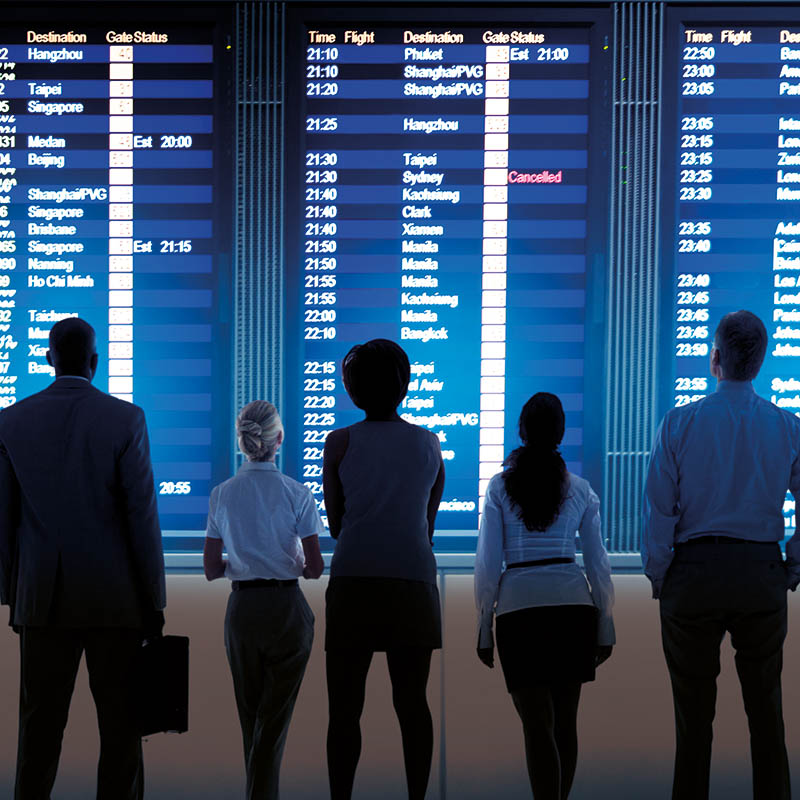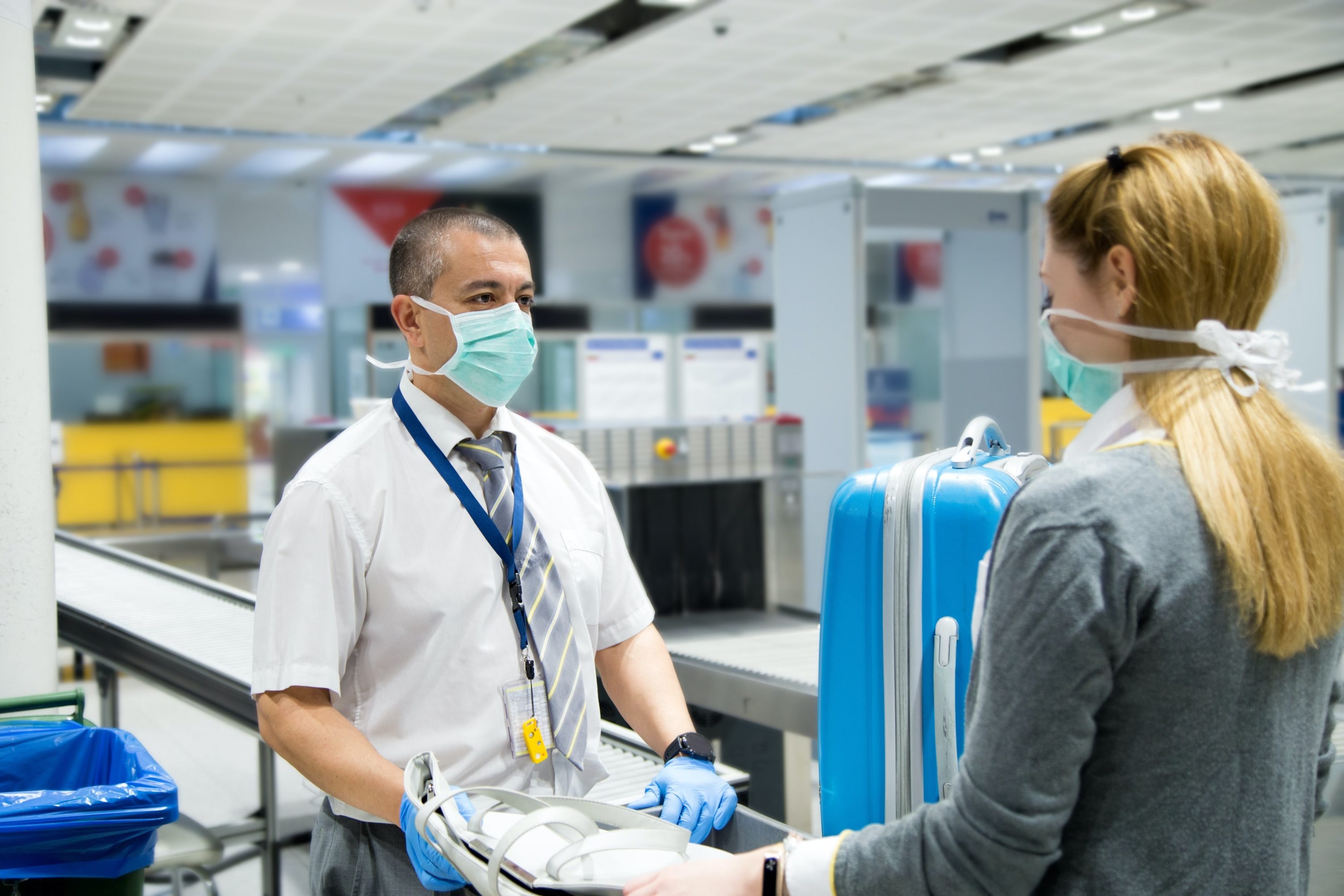New study reveals employees are impacted more than company profits by the lack of business travel due to COVID.
There are certain industries and practices we know have been changed permanently by the COVID-19 global pandemic. While one is certainly the rise in the acceptance of remote work as a viable alternative to a huge corporate office, the other often debated topic is (of course!) business travel. It seems the pandemic has shown us that, indeed, the one-meeting trip could have been a Zoom call.
“I’m certain that businesses will be resistant to having staff travel just for a meeting, and that’s it. Meetings can take place on Zoom, without the costs of travel, and without having the staff member away from the office,” Nick Brennan, the Founder & CEO of My UK Sim Card, told the source of this article, PromoLeaf. “However, not all meetings are just meetings. Many involve wining and dining as the meeting itself, or involve this after the meeting to develop relationships: for meetings like this, things will return to full normality.”
A new survey of 1,003 US employees who travel or have traveled for business prior to COVID-19 conducted by Censuswide reveals some surprising information about the true impact of business travel on companies, those employees who do the traveling, and even some thoughts on what the future of business travel might look like.
KEY FINDINGS
- 32% of respondents told us lack of business travel had a negative impact on their business, but 37% said it had a positive impact.
- 64% of business travelers enjoy their jobs less when they are not traveling, and nearly half (48%) are even considering a change in occupation.
- Motivation, productivity, and even the mental health of travelers has suffered due to the lack of business travel.
- One of the things travelers miss the most is the human connections they make. 45% have missed 10 trips or more, and an average of 7 connections per trip.
Lack of Business Travel and the Impact on Business
When asked, “Has your business been positively or negatively affected by not being able to travel for business?” 32% of our respondents said lack of business travel had a negative effect. However, 37% said the impact had been positive, and 25% said it had neither a positive or negative effect.
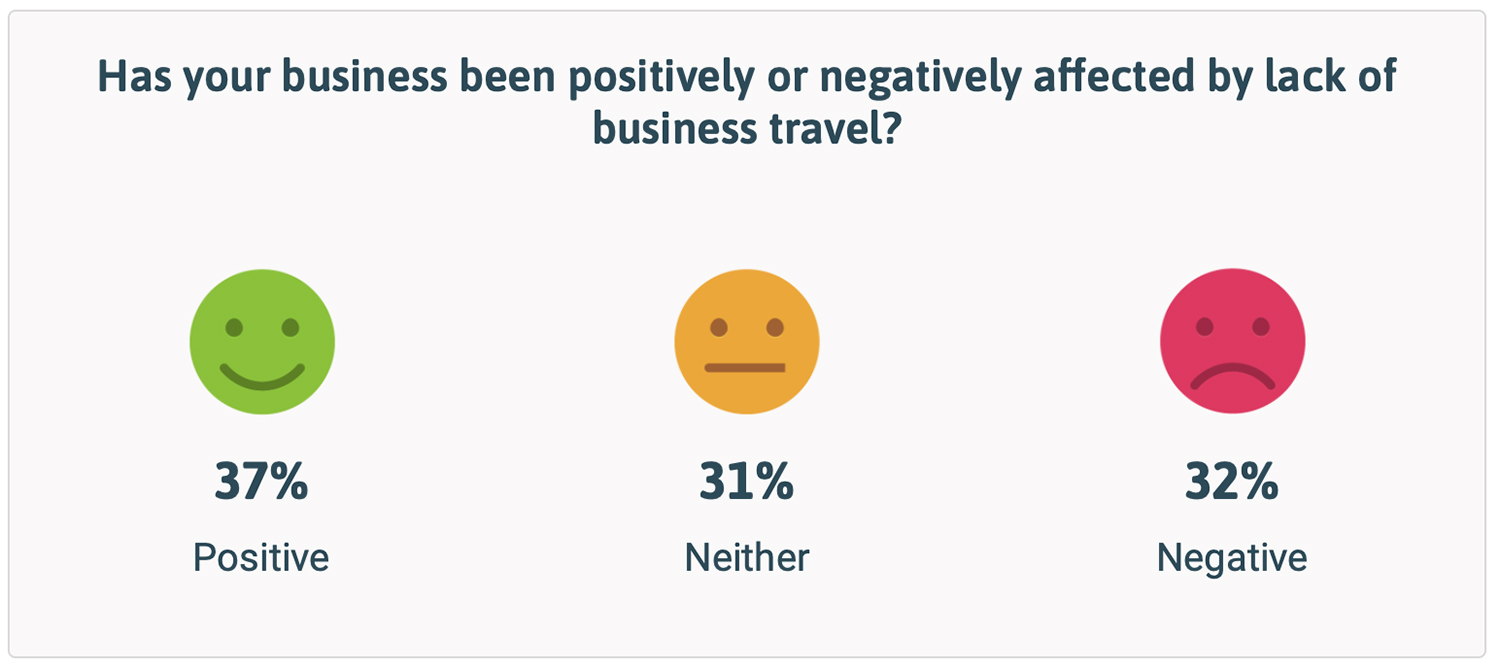
Additionally, of those respondents who travel most frequently (more than once a week), 60% said the effect had been positive vs. 21% said it had been negative. And of those 55 and older, 47% said the impact was negative vs. 8% who thought it was positive.
The nature of this question asked about the more general impact of the lack of business travel on business. But when asked how much revenue, if any, their business lost as a result of business travel restrictions, the answers reveal a different story.
Just over 16% of respondents stated their business did not lose any revenue due to the lack of business travel and another 18% lost less than 10% of revenues.
Tracy Lamourie tells us her company, Lamourie Media, has not lost any revenue due to missed travel. “We’ve been very strategic about using things like panels and podcasts to not only continue to build our reputation for thought leadership in our industry and across the sectors our diverse clients work in,” she told us. “I’ve replaced business travel [with virtual participation in panels, podcasts, and online conferences] I would likely have never attended in person, and been extremely successful at networking and building our partnerships and connects around the world, in spite of the current lack of cross border travel.”
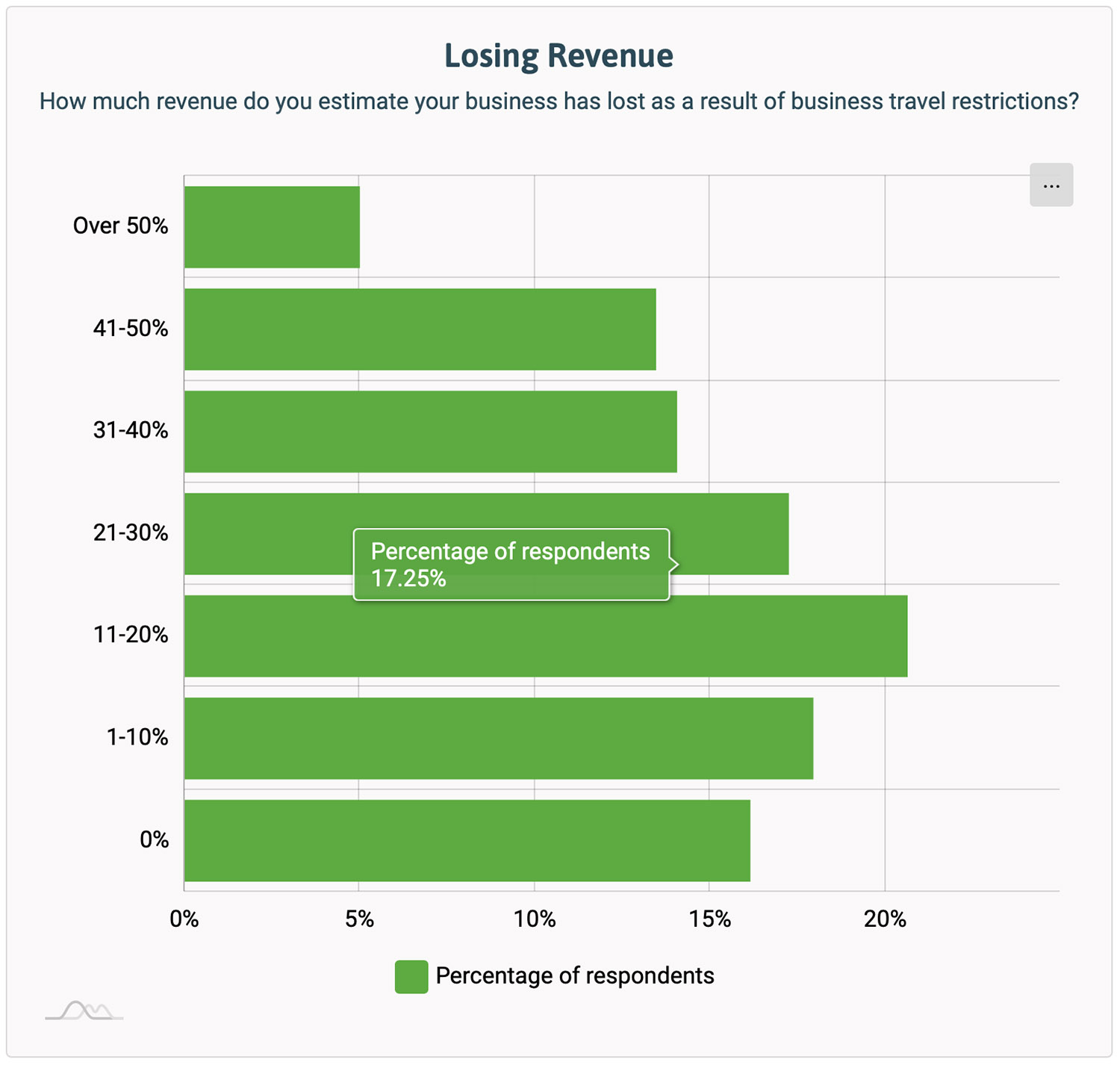
In contrast, 45% of respondents estimated their company has lost over 20% of revenue. Nearly 14% lost 40% or more. This loss of revenue can impact a company’s ability to stay afloat, let alone grow.
Jessica Lim, HR Manager at MyPerfectResume, has experienced these losses. “We attended many industry events in the past, which generated great business opportunities for our company,” Lim said. “Though we are still attending Virtual Events, this model prevents companies from creating personal connections. We also generate fewer opportunities, and it’s very challenging to promote our brand.”
In fact, for some businesses, these types of losses could be fatal and, for others, could result in significant workforce reductions and other critical cost-cutting measures.
A study conducted by Harvard Growth Lab showed the impact of business travel on more than just the economy and found the initial findings of researchers validated by the lack of business travel due to COVID. “We’ve been puzzled by the fact that business travel has been growing faster than world GDP, despite the widespread adoption of alternatives like Skype, FaceTime, email, etc.,” the researchers said. “We posited that maybe there is a difference between moving information and moving brains. We obviously never imagined a complete shutdown of business travel, but the paper allows us to delve into the consequences.”
Beyond the economic impact, what impact has the lack of business travel had on business travelers and their morale?
The Joys of Business Travel
We asked our respondents whether they would agree or disagree with the following statement: “My job doesn’t give me as much enjoyment now that I can’t travel for business or business travel is limited.”
A majority (64%) somewhat or strongly agree with the above statement. Just over 20% disagree, and the remainder of the respondents neither agree nor disagree. Just how much does this lack of enjoyment affect these travelers?
So much so that 48% are considering a change in profession. Of those who travel every day, 79% are considering a change in profession. The less frequent travelers are less likely to change careers, with the only majority in those who travel once every two months or less.
“I chose my job because of the travel it offered. Now, I really want to switch professions, as doing this job remotely simply doesn’t have the same appeal,” one anonymous business traveler told us. “However, I’ve decided to wait things out and see what the new normal looks like. Mainly because there aren’t currently any openings in my field where employees are allowed to travel like they used to anyway.”
For that reason alone, switching professions may not be an option for many. What do these travelers miss most about business travel?
What Travellers Miss About Business Travel
A solid 98% of those in our survey miss something about business travel. When asked to pick what, if anything, they missed about business travel and allowed to choose multiple answers, the top pick was exploring new places (51%).
“[Escaping] from the 9 to 5 routine is one of the things I miss most,” Brennan told us. “Even when work travel meant I was working longer, I preferred it because, as they say, a change is as good as a holiday.”
A close and related second most popular answer was “Bleisure,” the combination of business and pleasure trips often done by tacking a few extra days on to a business trip to explore the area traveled to.
“[I miss] physically being in a different place,” Lamourie told us. “Like Jamaica or Malta, to do business with locals, learning the local mores, habits, and attitudes. [That’s] something you can’t really replace on Zoom.”
The majority of those over the age of 55 said they miss face-to-face interactions the most, which was third on the overall list of things respondents missed. The psychology of travel in general backs this finding.
“We remember our connections with people more than anything else,” Michael Brein, Ph.D., a social psychologist and author with a specialty in travel, told The Points Guy. “[And] it happens so fast and furiously. We get rewarded [with] self-esteem and self-confidence. Travel puts you in a situation where new stimuli and novelty is coming at you so fast, and the more that it engulfs you and you incorporate it [in your life], the more you grow as a person.”
The escape often found in travel also ranked high on the list, with 42% happy to get away from their desks and nearly 40% grateful for the time away from home.
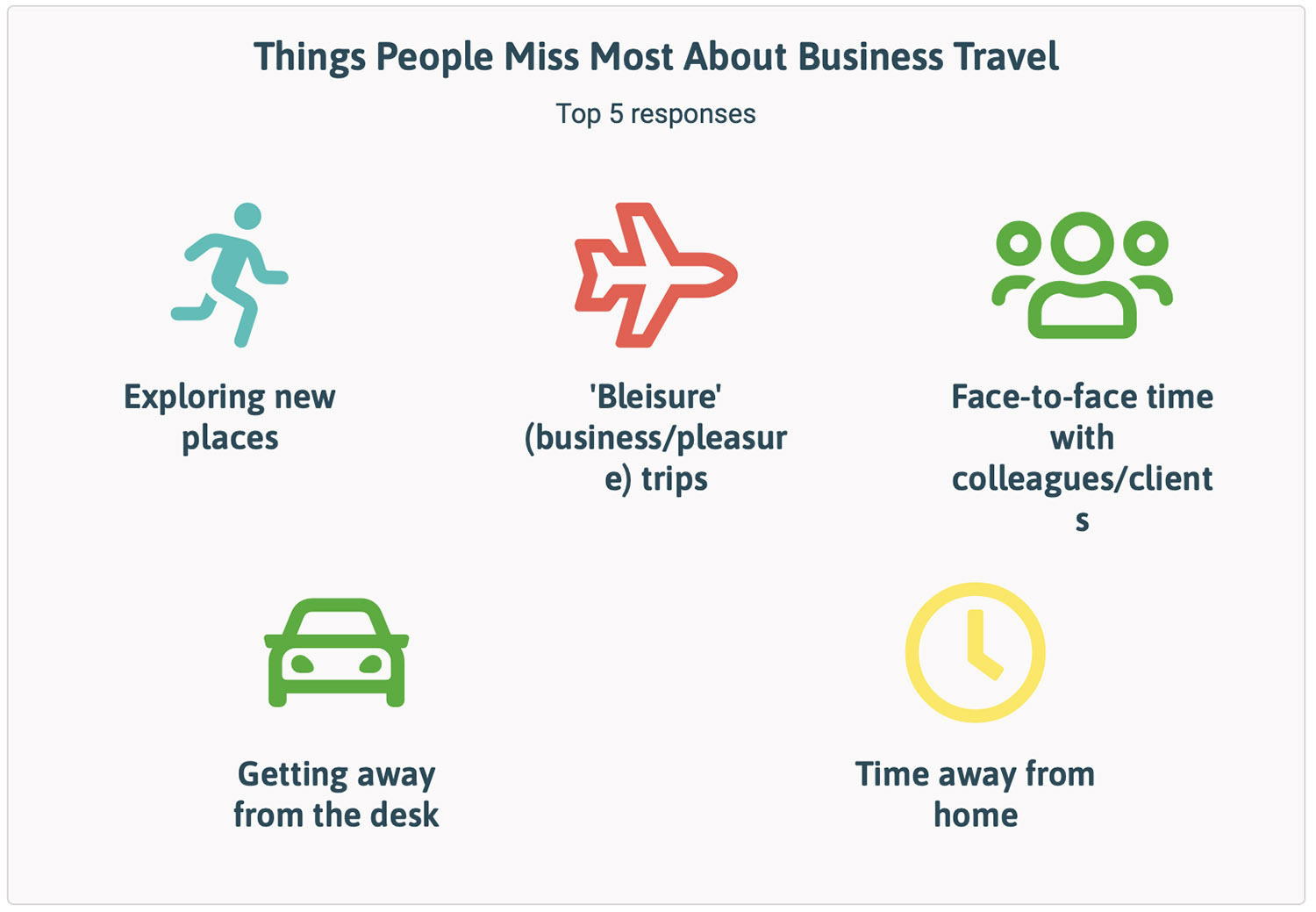
But what, if anything, has the lack of business travel negatively impacted?
The Downside of Not Travelling for Business
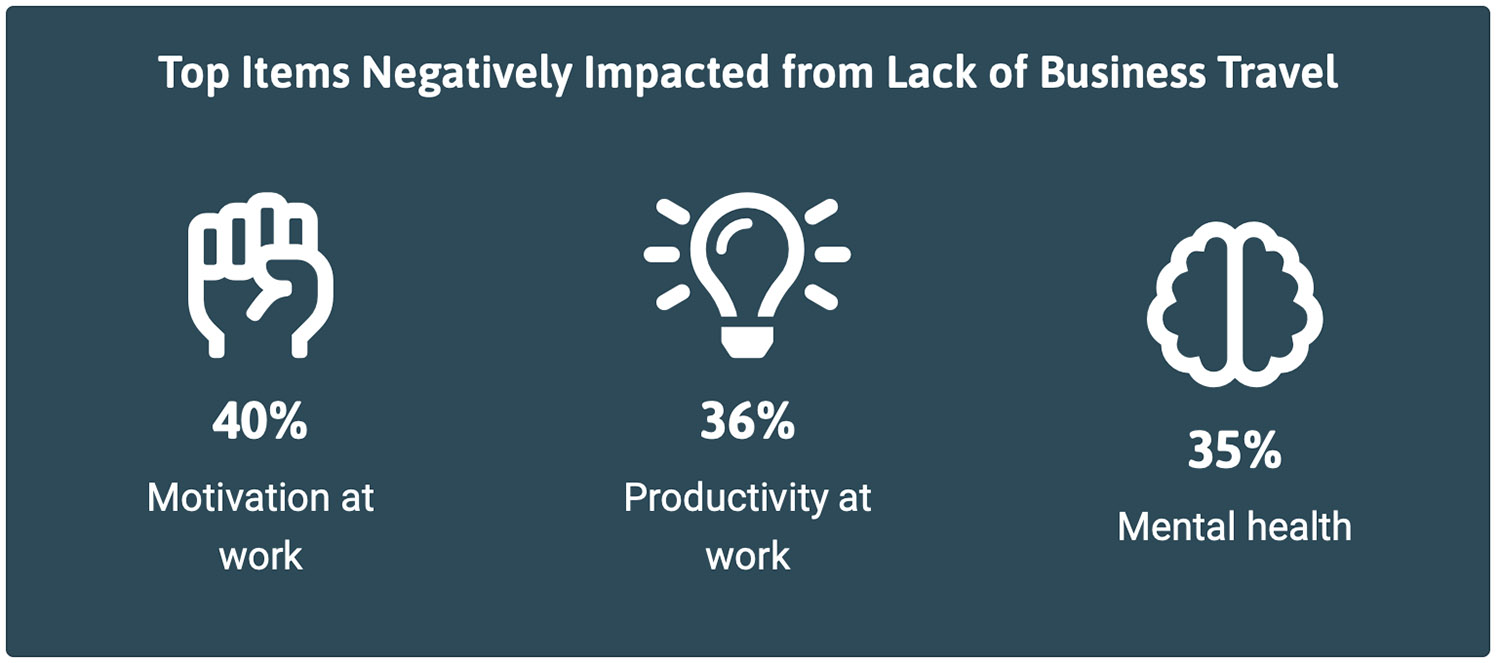
One of the more surprising answers was relationships: 24% felt their relationship with their partner had been negatively impacted, perhaps proving the old adage that absence does indeed help the heart grow fonder.
However, it could also be that many of those who traveled for business before restrictions are now doing much of their virtual travel from a home-based office. Overall, COVID has negatively impacted a lot of marriages, forcing couples who spent significant time apart into full-time childcare, home office sharing, and a new division of housework and decision making.
These new close quarters and remote working environments may very well be why nearly 19% say their relationship with their children has also been negatively impacted. The reality is people are missing external social connections from travel, working in the office, and even connections with friends.
Those things just don’t happen with video conferencing, phone calls, or emails. But can much of business travel be replaced by Zoom and other video platforms?
Video Killed the Business Travelling Star
While video may have actually killed the radio star back when MTV played music, has video really killed the business traveling star? When asked how ineffective or effective they thought video calls were at replacing face-to-face meetings, for our respondents at least, the answers are split pretty evenly for and against. Only a little over 13% were indifferent.
Just over 42% thought video was somewhat or very ineffective at replacing face-to-face meetings. Just over 44% felt they were somewhat or very effective. Interestingly, those who traveled at least once every 2 to 3 weeks leaned toward feeling they were ineffective.
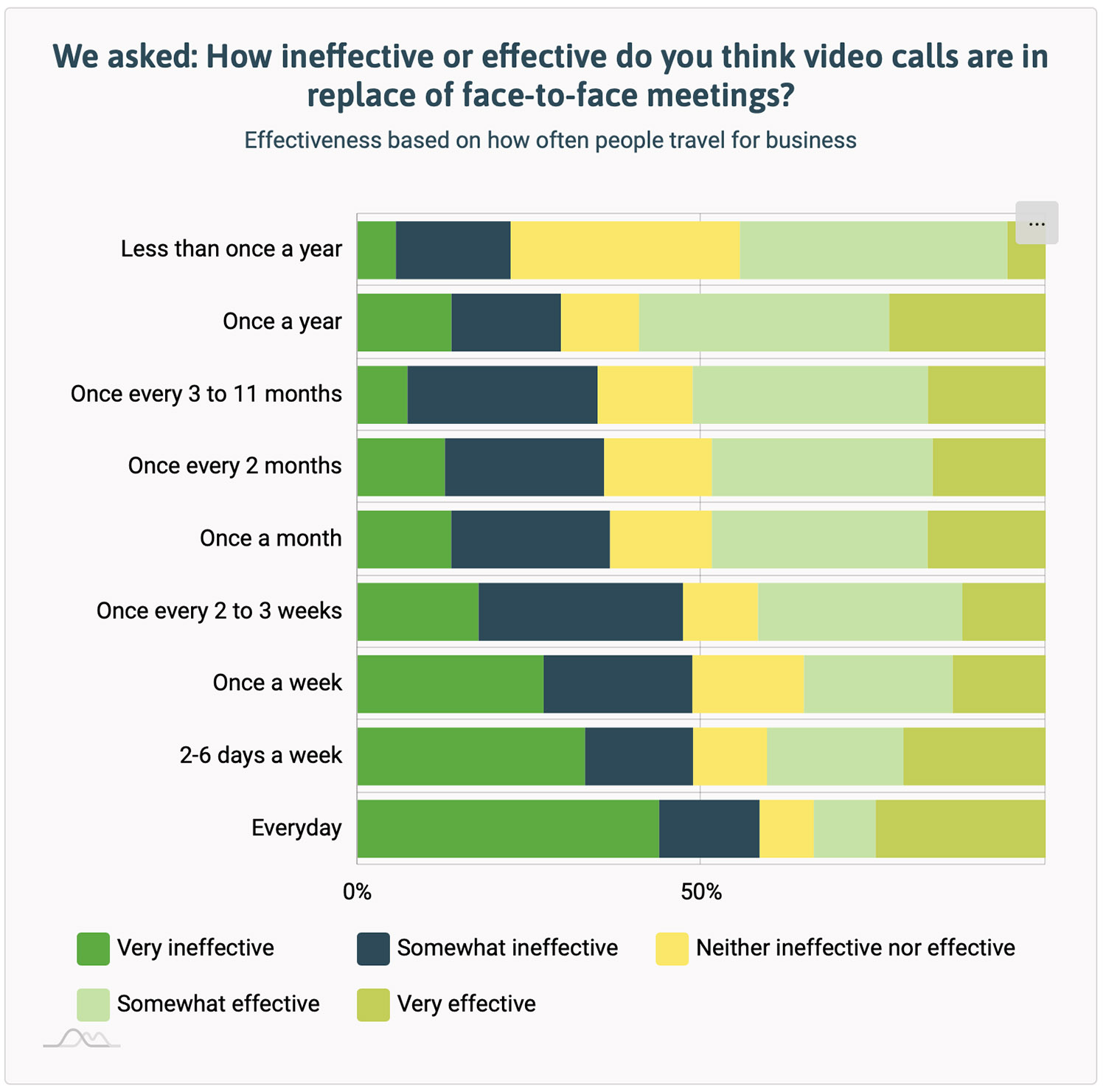
“It is clear that the lack of interpersonal communication that comes with business travel has throttled business development and new deals,” John Ross, the CEO of Test Prep Insight, told us. “It is just plain harder to close deals and develop new partnerships when you’re trying to do everything over Zoom. I am sure most veteran salespeople will agree.”
On the flip side, others feel that “Business travel should only be encouraged if it’s really necessary,” Jessica Lim says. “We’ve learned to get our job done and communicate with others through email or video calls, causing companies to save a lot of money on flights, accommodations, and daily travel expenses.”
“Employees in important client-facing roles will still travel to meet new clients and be present during the signing of major deals and documents,” Rolf Bax, Chief Human Resources Officer for Resume.io, told us. “But much of the routine travel, especially for visits to and checking in on subsidiaries and well-established partnerships, will be replaced by things like Zoom.”
“In the end, though, there will always be projects that need particular people to be in a particular place to do a particular thing,” Tracy Lamourie says. “So we will see the return of business travel as a norm, at least in many of the industries I work in.
Business travel will undoubtedly change at least for now, but it seems it won’t ever be 100% replaced by the video call. The reason is quite simple: the missed connections business travellers make, ones that are vital to business.
Missed Connection
When asked how many business connections they made per trip (pre-COVID), our respondents answered with a mean of seven. Under 3% said they made no connections at all. When we asked a follow-up question regarding how many trips they’d missed, nearly 45% said they’d missed more than ten trips.
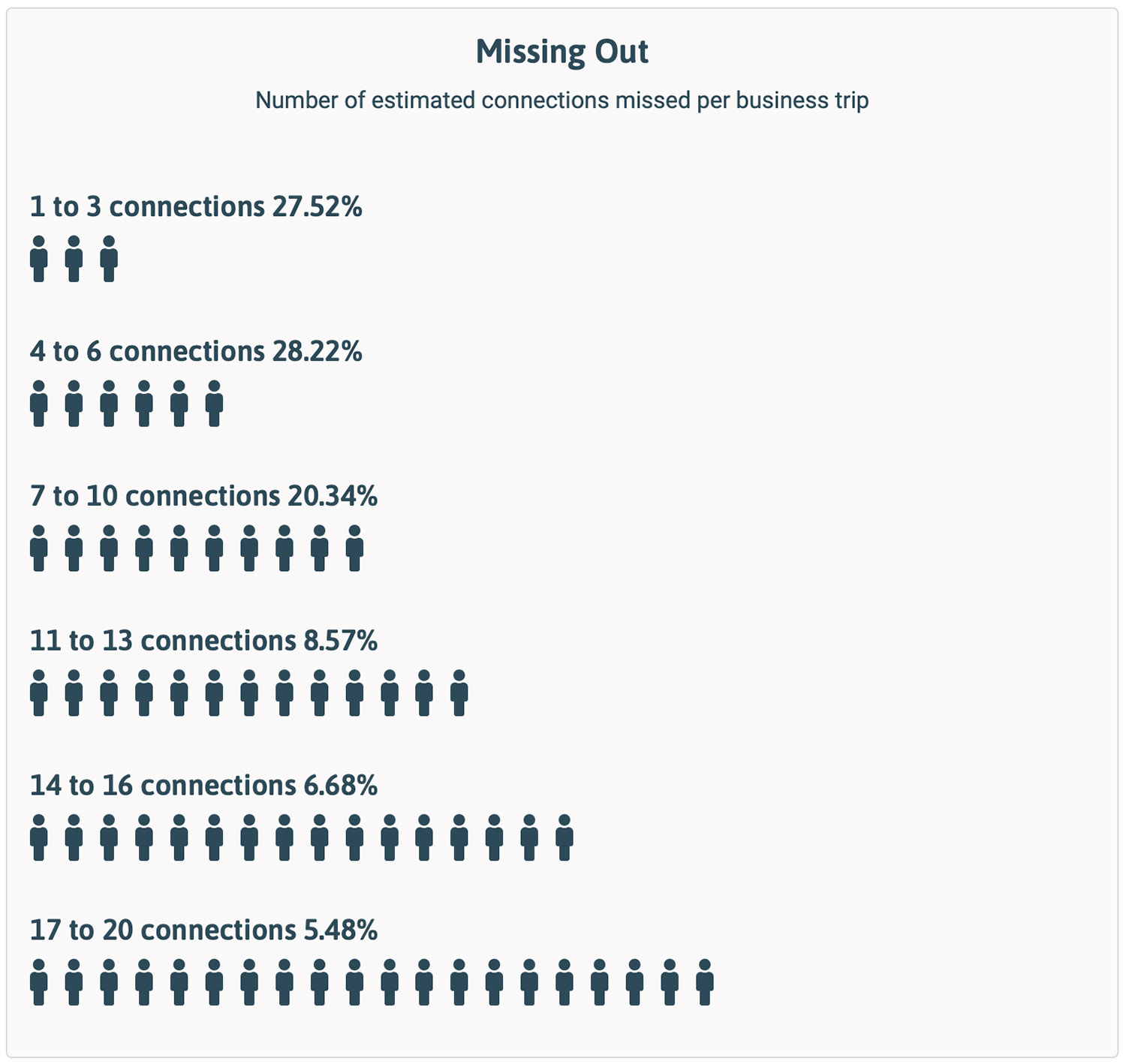
Suppose we take the mean number of connections per trip (7) and multiply that times ten missed trips, we can conclude that 45% of travelers missed an average of 70 connections made in person this year. As it is much more challenging to make the same kind of relationship virtually, it’s unlikely that those kinds of contacts have been replaced by those forged in a digital realm.
The incalculable value of these connections often drive business travel in the first place, pandemic or not.
Conclusion
What do we know about the future of business travel? First of all, it is likely to return, but also not likely to return to pre-pandemic levels. “Business travel will undoubtedly return, just as general travel will,” Bax stated. “But it will be reserved for those with up-to-date vaccinations and vital relationship-building missions.”
“I hope that business travel will return; I know for me I have several trips clients want me to take lined up when that becomes possible again,” Lamourie told us. “But I do think for many, especially on the corporate side, a lot of it will be limited and relegated to Zoom where possible.”
And that seems to be a recurring theme. While most companies seem to love the financial savings, business travelers are hopeful the value of their role will be fully realized when things return to some kind of normal. “I personally think that business travel will come roaring back after the pandemic subsides later this year,” John Ross said. “I plan to fully open business travel back up once my team has their vaccinations, and I feel that people are ready to start seeing clients in person.”
While the short-term impacts of the lack of business travel can be clearly seen, the long-term impacts are yet to be revealed. That being said, “This trip could have been a Zoom call” will be much less a joke than it will be a corporate standard for evaluating the true need for business travel in any given situation.
“Many companies, ours included, are reconsidering the need for regular business travel,” Paul French, the CEO of Intrinsic Search, told us. “In many ways, business travel will be forever changed in that companies will likely cut down the travel budget now that it is evident that some aspects of business can be done remotely. As businesses struggle with lower revenue, many will reevaluate the ROI of frequent travel and limit their budgets to essential travel.”
That’s inevitably the dilemma, and one with no easy solution. Defining essential travel means evaluating the value of the connections made, the impact of an in-person handshake, and the risk and the cost of travel. The bottom line is a little blurry in this case, but you can be sure business and business travelers alike will be working to bring it into focus as the pandemic fades and a new normal emerges.
To help you navigate the changes of business travel, we’ve created the brand-new Traveller Toolkit. This invaluable online resource is packed full of easy-to-use guides and checklists for every stage of every journey. We detail exactly what you need to know and do before, during and after your trip.
You’ll also find innovative and interactive virtual trips, which walk you through each step of being at the airport, on the train and in the hotel. You can even check the travel restrictions and health status of your destination with our comprehensive COVID-19 Country Tracker, updated five times daily to ensure you have the very latest information to help keep you and your travellers safe.
Travel is changing. But with common sense and a good TMC behind you, travellers should have the confidence to once again take to the skies. It’ll soon be business as (un)usual.

